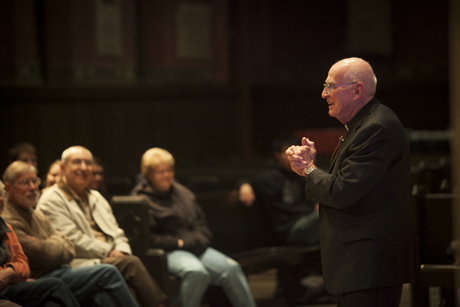Jesuit: God and science are not incompatible
By Jacques Diec

“Did God create the universe?” asked the Rev. George Coyne, a Jesuit priest, in the semiannual Beggs Lecture on Science, Spirituality and Society Nov. 11.
Answering his own question, Coyne, the McDevitt Professor of Religious Philosophy at Le Moyne College in Syracuse, N.Y., admitted, “I don’t know.”
A former director of the Vatican Observatory, Coyne said the universe, at 13.8 billion years old, is a perpetually evolving continuum, home to hundreds of billions of galaxies thousands of light-years across that contain hundreds of billions of stars. Only 13.6 billion years after it came into existence did sentient creatures emerge to ponder its origins.
“As we look out in space, we’re looking back in time,” Coyne said in his talk, “The Dance of the Fertile Universe: An Interplay of Science and Religion.” “What we want to do is look into our galaxy and see where we came from.”
Coyne argued that human understanding of what exists was contingent on biased, individual perception. “We never see anything as it is, but as it was,” he said. Noting that it’s worthwhile to appreciate the wonders that lie beneath the universe’s complexities, Coyne said, “In [our] planetary system we [are] this little grain of sand. It’s one of eight planets around one of 200 billion stars in one galaxy of a hundred billion galaxies. But on this grain of sand a marvelous thing happened … that not even scientists honestly appreciate enough; we developed the ability to put the universe in our heads. The universe is no longer in blind evolution. In us [it] is reflecting upon itself.”
Coyne argued for the inclusion of spirituality with empirical rationalism in our attempt to further dissect the universe; he sees faith as a guiding instrument rather than an obstructive force in science’s journey to unveil the unknown.
“So many scientists exclude God, and so many scientists include God, and that’s poor science and poor God. It is very important that science and religion talk to one another in a sensible way, not talking over one another.”
Faith, said Coyne, “is an acceptance without total proof; an acceptance of what God has revealed to us.” Paradoxically, he said that faith should be a driving force behind scientific reasoning. “Scientists make a fundamental assumption that things work out there the way they work here. … There’s no way to prove it.”
Explained Coyne: “I can’t even get to the Andromeda Galaxy, 2 million light-years away, to test whether gravity works. The best you can do is make an assumption and then discover the universe with that assumption and find out at the end that there’s not a proof, but a coherence.”
Through science, he said, we attempt to comprehend the universe as objectively as possible with facts and empirical data, but it is ultimately our faith that completes our understanding and stimulates our investigation by allowing us to appreciate the unempirical data that lie underneath.
Jacques Diec ’15 is a writer intern for the Cornell Chronicle.
Media Contact
Get Cornell news delivered right to your inbox.
Subscribe